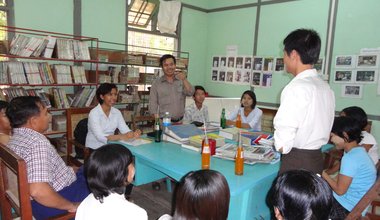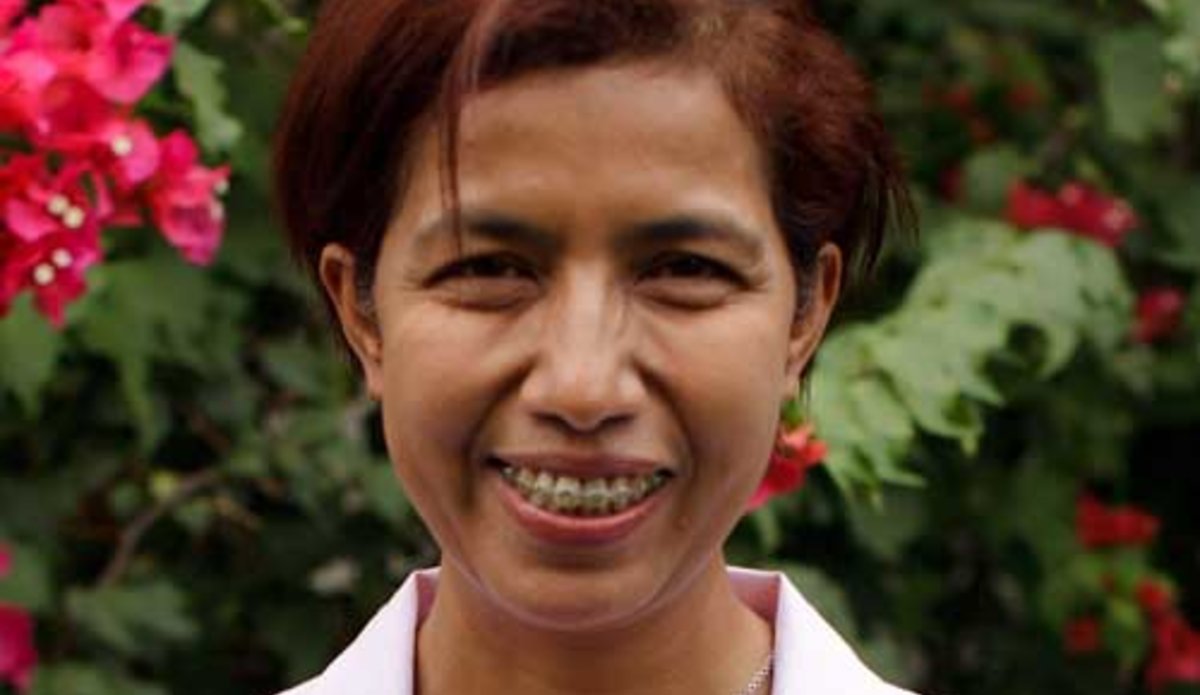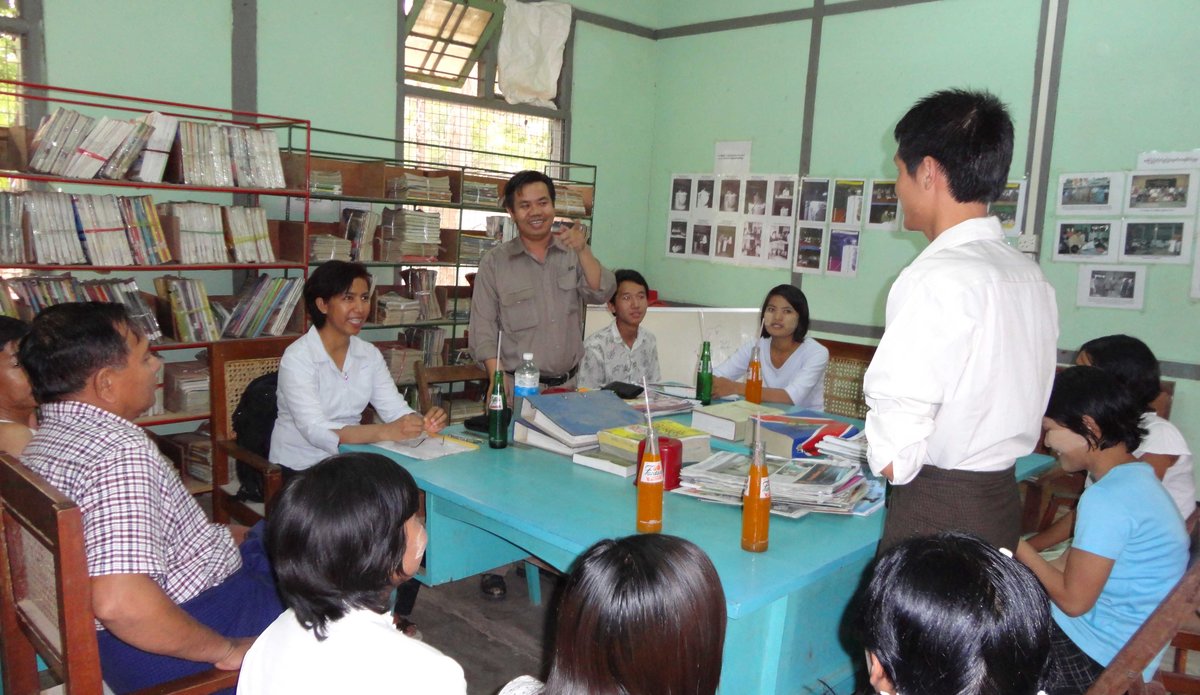Nilar Kyi: Holding the key to transform inspiration into action
On 12 January 2010, the world heard the news about Haiti’s earthquake, one of the strongest since 1770 (7.0 magnitude). Most of us were alerted and followed the news, hoping the best for the Haitians. NilarKyi, a UN volunteer working as an IT assistant for the African Union-United Nations Mission in Darfur (UNAMID) did not hesitate to approach the Unit in charge of raising funds. She donated one thousand dollars to bring relief to the Caribbean island. In fact, since her deployment to Darfur in June 2008, Nilar has been saving USD$50 every month waiting for the opportunity to spend it on the right cause. Haiti was just about right. And she keeps on saving.
Born in Myanmar (also known as Burma), Nilar came to Darfur encouraged by her beliefs: To do good things to all, to avoid bad things and to purify herself. Being a Buddhist, she believes in volunteerism not as an experience, but as a core human value. Therefore, to have the opportunity to come to the Sudan and help to bring peace and development to Darfuris offering all her knowledge on Information Technology sounded like a fair next-step after being a teacher for almost 30 years in Myanmar. With this background, Nilar joined the biggest peacekeeping operations as of today –UNAMID- and started a journey that not only changed her life but also the lives of 15 children in Myanmar this far. And this is how the story of “Lucky Bees” evolved from inspiration into action.
On February 1997, the Burmese Government allowed a third party trust to acquire interim ownership of the Sabetaung-Kyisintaung Copper Mine, located in central Myanmar. When the Ministry of Mines of the Union of Myanmar reduced the strength of employees to transfer to the joint venture organization,this action affected nearly 400 families. Their incomes drastically decreased when they were asked to leave their jobs or to take early retirement. The communities living in the outskirts of the mine were soon facing a financial crisis which affected the children the most. Forced to keep expenses to the minimum, some families stopped sending their kids to school.
With awareness of these difficulties and also with a belief that education is a key to bringing social changes in Myanmar, Nilar took action. She choseeight children from the Mine School in Salingyi Township, Sagaing Division and paid for their tuition and other school expenses for the academic year of 2009-2010 out of her Volunteer Living Allowance (VLA). In order to do the deed properly, she created a small foundation called “Lucky Bees” with a vision to “reward the hard working children in school –who are like bees– and make them lucky enough to be able to shape their future the best way possible,” Nilar explained.
At the same time, being very much committed to her UN volunteer assignment, which involves assisting the Server Management Unit and Training Unit, Communications and Information Technology Section Administration in several ways, Nilar had to implement her dream to help the Mine Town community remotely. She asked one of her ex-colleagues back home for help.
“The first year, we had resources to help eight kids whohad to leave school even though they showed an outstanding performance in all subjects. However, as I am currently serving in Darfur, I had to ask a friend to choose the beneficiaries on my behalf. My criteria: only take those who needed my help the most and were truly excellent at school. I did not meet any of the eight students until two years later, in April 2011, when there were already eleven of them. My friend did a great job and the results have been amazing for me and for the children. Some of them already graduated and are planning to go to University, also with our assistance.”

“I love children. Since I was 17 years old I have been a teacher. In the course of my life I have realized that if we educate our children to be good persons in their minds, they will have good thoughts and will be good people. This creates a positive environment anywhere.”
Talking about her experience when she first met her beneficiaries, Nilar was filled with emotions. She did not realize but she held her hands together, and pressed her chest as she explained: “when I arrived in Mine Town on 6 April 2011, I was picked up by a motorcycle that the community rented to bring me to their place. There, they offered me a soft drink and some cakes. Then, one of the little girls gave me a scarf that she was making herself. The scarf was not finished yet but she wanted me to have it. […] I told them why I decided to start the foundation. It is because I know one person cannot change the whole world, but each one of us can change what is around, the environment around us. And you are the evidence, I told them, I have changed you.” After this, the children promised Nilar that once they grow up they will start doing the same i.e. to try to change at least one life for the better.
Lucky Bees was not planned to be a temporary solution. In 2010, Nilar took in another three students and by the beginning of 2011 she was already supporting fifteen children.
As Nilar viewed volunteering as a service, not as a job, she knew that her foundation could not rest only on her allowance. Hence, in January 2011 she established a company to provide financial support to the foundation. This company also plans to employ some of the beneficiaries who already graduated, thereby, helping to ensure that these fresh graduates could have their first work experiences soon after graduation.
“At first what I did was just to give the money from my own VLA to support the children. Later on I realized that I need to find a way to make sure that the foundation will keep on going even if I personally don’t have the means to support it in the future. So, we started making some blouses, some shirts, and bags. We started with fifteen sewing machines and industrial ironing machines. There are now seventeen employees, one supervisor, one manager, and one consultant. The purpose of the factory is to support the beneficiaries of “Lucky Bees”. I don’t want the foundation to depend only on me or my work status. I also do not want our mission to end when the children finished school. I have also made the commitment to help them to go to public university -those who want and are accepted. So this is why I started the business.”
Today, Nilar’s garment company is not yet profitable. Nevertheless, she remains optimistic that within a year this enterprise will sustain itself.
On top of her current efforts to make sure that fewer children from the Mine Town drop out of school, Nilar is starting a project to be developed within the 2011-2012 timeframe. She is aiming to educate small children on self-care and environmental care, and, in the meantime, also keeping those beneficiaries who already graduated busy and productive while they wait for university enrolment. “I don’t want them to waste time. So I have designed a project, based on educational videos, to teach small kids to take care of themselves. The focus would be on health so that these children would have some understanding of their body, and also how to relate with the environment and everything that surrounds them. These videos need to be translated from English into Burmese, and I can take care of that but I want the young ones to get involved also. In Myanmar, people don’t speak English as much, so I want them to improve as much as they can and be sufficient at English hoping that in the future they can apply to whatever job openings there are, and compete fairly in the international arena.”
Listening to Nilar one understands the challenges ahead when one talks about peace, development and specially cooperation and volunteerism. There is a lot of thinking being done around these topics and people are being inspired every second to do something good and to help one another; nevertheless, the rate at which we all transform our good intentions into reality doesn’t reach the pace at which our communities need to be helped.
So let us be inspired by Nilar Kyi and start conquering the borders of thinking versus doing.
By Natalia Herrera Eslava (UNV Field Unit Communications and Advocacy Officer, UNAMID)
 UN
UN United Nations Peacekeeping
United Nations Peacekeeping





